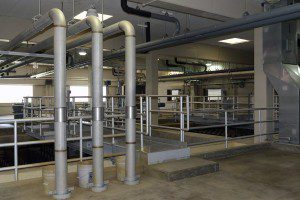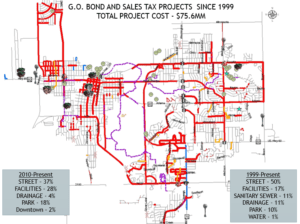Budget includes rate adjustments for City utilities

Bartlesville’s potable water is treated at the Ted D. Lockin Water Plant, located northwest of the city.
The Bartlesville City Council voted 5-0 Monday to approve the proposed Operating and Capital Projects budgets for the upcoming 2021-22 Fiscal Year. The budget adoption process will be finalized this month and budgets will go into effect July 1.
The FY 2021-22 Operating Budget is based on flat sales tax projections for the upcoming year and includes $2.9 million in federal stimulus funds provided through the American Rescue Plan Act of 2021.
The budget also includes fee adjustments for City of Bartlesville utility customers, which are necessary to fund upcoming capital needs mandated by the Oklahoma Department of Environmental Quality and Environmental Protection Agency and to maintain the current level of utility services.
“There are three components to this: fresh water, wastewater, which some people call sewer, and sanitation, or trash,” said Mayor Dale Copeland. “Fresh water and sanitation are changing but not significantly — they are going up to cover the costs so that we can at least remain neutral on our cost and not go in the hole. But the real challenge that we have is wastewater. That’s where the biggest piece of this is happening.”
The City is under mandate to make extensive upgrades to its wastewater infrastructure, including an estimated $45 million in waste water treatment plant renovations. The cost to complete all required utility upgrades is around $65 million.
“Nobody is excited about wastewater until they have a problem or they get a bill, but it is hugely expensive,” Copeland said. “In the length of time I’ve been on the council, we have been talking about wastewater year after year now.”
Copeland said the first three phases of waste water improvements were funded through cash flow but that the fourth phase, the wastewater treatment plant renovations, will require extensive financing.
“We cannot do Phase IV that way,” he said. “A $45 million sewer plant is probably one of, if not the biggest capital projects this City has undertaken. We don’t have a choice. We are mandated by EPA and ODEQ to do this. We’ve known that for some time. We have tried to pace it as well as possible but that day is now upon us.”
The rate increases are based on findings from a recently completed study by consultant company NewGen. The company conducted a comprehensive cost study for the City’s water, wastewater and solid waste services based on several criteria including operating and maintenance expenses, outstanding debt service, capital outlay, and vehicle replacement costs.
The increases represent an approximate 7.8 percent increase in utility rates for the average residential customer, and will mean an increase of about $7 per month in utility fees based on 6,500 gallons of water usage and 4,500 gallons of wastewater.
The adjustments include a $1 increase for base water rates and a $0.25 per thousand gallons for water, a base increase of $2 and an incremental rate increase of $0.20 per thousand gallons for wastewater, and an increase of $1.50 for sanitation carts in addition to an increase in commercial sanitation rates.
The City’s current rates are lower than cities in the region of similar size, a status that will not significantly change even with the increase, CFO/City Clerk/Treasurer Jason Muninger told the council.
“The increases will bring our rates from the lower end of the spectrum to around the middle in comparison to other cities our size,” Muninger said.
NewGen has recommended the rate increases be spread out over a five-year period, beginning with the first increase on July 1; however, the council opted to approve only first-year increases with plans to review options for potential increases in future years. Some adjustments to the schedule could include delaying the effective date to avoid higher water costs in the summertime and/or slowing the escalation of the increases over future years.
Copeland said all five councilors are mindful of the impact these and future rate increases will have on Bartlesville residents and businesses but that the adjustments cannot be avoided.
“This council is extremely sensitive to this,” said Copeland. “We get the same utility bills that everyone else in the room and the city gets. We do not take these actions lightly, recognizing that our city has to conform and comply, for so many reasons, with requirements for water, wastewater and sanitation and the costs that go with that. So we do understand the impact. We also understand the need to maintain the cash flows that Mr. Muninger talks about and to operate our city in a safe, responsible way.”
Other highlights in the FY 2021-22 budget include:
- Allocation of $250,000 for operation of the Bartlesville Municipal Airport
- Cost of Living Adjustments and merit increases for City employees
- Allocation of $871,520 for the Stabilization Reserve Fund
- Reinstatement of building inspector, assistant fire marshal, police property/evidence specialist, three police officers and two maintenance worker positions that were eliminated during previous economic downturns

This graphic illustrates areas of Bartlesville where capital projects have been funded and completed since 1999. “Every effort is made to identify needs and complete these necessary projects in each area of our city,” said City Manager Mike Bailey. “City councils past and present have been mindful of this and have worked diligently to ensure equity across the community.”
Capital projects
Also approved Monday was the Capital Projects Budget, which includes expenditures funded through the City’s Half-cent Capital Improvement Projects (CIP) Sales Tax and General Obligation Bonds, both of which are approved by voters.
The upcoming budget includes $7.9 million in G.O. Bond funding for capital projects and $2.7 million in Half-cent CIP Sales Tax funds. Capital projects budgeted to receive funding in FY 2021-22 include:
- Numerous street repairs
- Replacement and emergency vehicles, body-worn cameras and dispatch chairs for the police department
- Emergency police communications infrastructure and radio system
- A 95-foot tower ladder fire truck and equipment
- Artunoff Softball Field and Lee Lake parking lot improvements
- City Hall boiler and chilling tower replacement, roof repairs
- GPS camera parking enforcement system
- Douglass Park parking lot repairs
- Sooner and Frontier pools epoxy repairs
- Tuxedo Bridge (Caney River) rehabilitation
Bartlesville Development Authority, Visit Bartlesville
The council also approved $897,600 for the Bartlesville Development Authority budget, which is used for economic development. The council oversees funding for the BDA, which works to recruit industry and retain jobs in Bartlesville. Money for this program is provided via the voter-approved Quarter-cent Economic Development Sales Tax. Visit Bartlesville, which promotes tourism to the area, is also funded through the BDA budget.
For a full list of capital projects that will receive funding during FY 2021-22, see 2020 G.O. Bond Projects and 2020 CIP Projects. To read the budget in its entirety, see 2021-22 Fiscal Year Budget.
